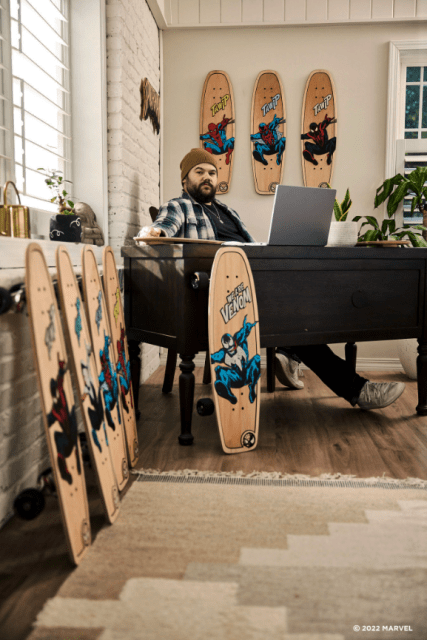I had a chance to chat with Bear Walker noted skateboard designer from his headquarters in Daphne, Alabama about the evolution of his world famous work. At the outset I was curious how Daphne became a hotbed of such activity. Bear said that “the coastal city vibe has a lot to do with it.” He grew up surfing, but when he moved away from the coast skateboarding took hold of him. He grew up in carpentry and construction but always leaned into the artistic and studied to get a graphics degree.
He found himself enjoying woodcarving the most, and figured out a way to create sufficient friction for skateboards. Instead of grip tape, the wood and character design itself are carved for ultimate traction and a statement design. As a result, each board is truly one of a kind.

As he hit his stride in form and function, other folks began to request decks and he began taking orders. “It took me eight years to become an overnight success,” admits Bear. “My first business venture failed, and I had to work out of a barn, but by saving up, I was able to slowly build the business.”
Because he always reflected popular culture in his work, Bear drew the attention of celebrities and studios with orders for custom boards. The former were buying limited edition runs for gifts and studios were buying for special collectors.
Bear’s first big licensing deal was for Lost In Space, Netflix wanted a plexiglass deck with sections that lit up. “One of the units was shot into space,” Bear mentioned. Most recently Marvel has leveraged Bear’s prowess. The various Justice League characters have featured in many of Bear’s designs. He humbly dropped names when I asked him what celebrities had ordered from him: Robert Downey, Jr., Jason Momoa, “Shazam!” star Zachary Levi and singer Billie Eilish were mentioned.


Bear’s operation has grown 230 employees, with everything produced in house. Walker is the Creative Director and he has several in-house designers who bring specialties like portraiture and color pops into the mix. He has two channels of distribution, either through his own website or wholesale to licensors.
Most orders are for decks only, as his customer base is mostly collectors. He also has trucks and wheels available, so he can deliver a full set up. In addition to only using the highest quality materials, the company plants one tree for every board sold.
As to his licensing strategy, Bear says it goes both ways; sometimes he reaches out and most times companies are coming to him. But he only works on projects he is passionate about.
Certainly his attention to detail and status as a fan is what keeps licensors and collectors coming back for more. Indeed, Bear’s tendency to drop in Easter eggs makes his designs that much more appealing. The limited edition nature of his production goes hand-in-hand with his desire for an elevated experience, which tends to make the owner feel special about owning it. Nonetheless, the company has grown from producing just a couple thousand boards each year to averaging about 35,000 annually, with a price range of $200 to $300.
Bear doesn’t limit himself to thinking of the company as a skateboard company; he is more about blending functionality with aesthetics and is therefore getting into high-end guitars.
Some of the most artistic and functional skateboards are coming from a little town on the Gulf Coast.
Who knew?




Recent Comments